Revision Question Bank 60 PDF

| Title | Revision Question Bank 60 |
|---|---|
| Author | Natalia Shershun |
| Pages | 154 |
| File Size | 2.2 MB |
| File Type | |
| Total Downloads | 99 |
| Total Views | 504 |
Summary
F or E xam i n at i on s t o Au gu st 2 0 15 REVI SI ON QUESTI ON BANK ACCA Paper F4 | CORPORATE AND BUSINESS LAW (ENGLISH) ATC International became a part of Becker Professional Education in 2011. ATC International has 20 years of experience providing lectures and learning tools for ACCA Profession...
Description
For Examinations to August 2015
REVISION QUESTION BANK
ACCA Paper F4 | CORPORATE AND BUSINESS LAW (ENGLISH)
ATC International became a part of Becker Professional Education in 2011. ATC International has 20 years of experience providing lectures and learning tools for ACCA Professional Qualifications. Together, Becker Professional Education and ATC International offer ACCA candidates high quality study materials to maximize their chances of success.
In 2011 Becker Professional Education, a global leader in professional education, acquired ATC International. ATC International has been developing study materials for ACCA for 20 years, and thousands of candidates studying for the ACCA Qualification have succeeded in their professional examinations through its Platinum and Gold ALP training centers in Central and Eastern Europe and Central Asia.* Becker Professional Education has also been awarded ACCA Approved Content Provider Status for materials for the Diploma in International Financial Reporting (DipIFR). Nearly half a million professionals have advanced their careers through Becker Professional Education's courses. Throughout its more than 50-year history, Becker has earned a strong track record of student success through world-class teaching, curriculum and learning tools. Together with ATC International, we provide a single destination for individuals and companies in need of global accounting certifications and continuing professional education. *Platinum – Moscow, Russia and Kiev, Ukraine. Gold – Almaty, Kazakhstan
Becker Professional Education's ACCA Study Materials All of Becker’s materials are authored by experienced ACCA lecturers and are used in the delivery of classroom courses. Study System: Gives complete coverage of the syllabus with a focus on learning outcomes. It is designed to be used both as a reference text and as part of integrated study. It also includes the ACCA Syllabus and Study Guide, exam advice and commentaries and a Study Question Bank containing practice questions relating to each topic covered. Revision Question Bank: Exam style and standard questions together with comprehensive answers to support and prepare students for their exams. The Revision Question Bank also includes past examination questions (updated where relevant), model answers and alternative solutions and tutorial notes. Revision Essentials*: A condensed, easy-to-use aid to revision containing essential technical content and exam guidance. *Revision Essentials are substantially derived from content reviewed by ACCA’s examining team.
®
ACCA
PAPER F4 CORPORATE AND BUSINESS LAW (ENGLISH)
REVISION QUESTION BANK
For Examinations to June 2015
®
©2014 DeVry/Becker Educational Development Corp. All rights reserved.
(i)
No responsibility for loss occasioned to any person acting or refraining from action as a result of any material in this publication can be accepted by the author, editor or publisher. This training material has been published and prepared by Becker Professional Development International Limited 16 Elmtree Road Teddington TW11 8ST United Kingdom.
Copyright ©2014 DeVry/Becker Educational Development Corp. All rights reserved. All rights reserved. No part of this training material may be translated, reprinted or reproduced or utilised in any form either in whole or in part or by any electronic, mechanical or other means, now known or hereafter invented, including photocopying and recording, or in any information storage and retrieval system. Request for permission or further information should be addressed to the Permissions Department, DeVry/Becker Educational Development Corp.
Acknowledgement Past ACCA examination questions are the copyright of the Association of Chartered Certified Accountants and have been reproduced by kind permission.
(ii)
©2014 DeVry/Becker Educational Development Corp. All rights reserved.
REVISION QUESTION BANK – CORPORATE AND BUSINESS LAW (ENG) (F4) CONTENTS Question
Page
Answer Marks
Date worked
MULTIPLE CHOICE QUESTIONS 1 2 3 4 5 6 7 8 9 10 11 12 13 14 15 16 17 18 19
English legal system Tort law Elements of contract law Contract law – terms Contract law – breach Employment law Agency Partnership Corporations and legal personality Company formation Memorandum and articles Share capital Capital maintenance and dividends Loan capital Company directors Other company officers Company meetings and resolutions Insolvency and administration Fraudulent and criminal behaviour
1 3 8 12 15 20 23 26 30 32 35 37 39 42 45 48 50 52 56
1001 1002 1003 1004 1005 1006 1007 1008 1009 1010 1011 1011 1012 1013 1014 1015 1015 1016 1017
24 34 29 23 40 37 26 27 14 26 15 15 27 22 24 16 21 36 24
Section B of the Examination will include only six mark questions (see Specimen Exam). All past exam questions shown below have been adapted. TORT LAW 1 2 3 4 5
Bizzy Ltd Professor Parfitt Gregory, Douglas and Michael Escapade Ltd Netscape Ltd and Netscope Ltd
59 59 59 60 60
1019 1019 1020 1020 1020
6 6 6 6 6
60 61 61 62 62 62 63 63
1021 1022 1022 1023 1024 1024 1025 1026
6 6 6 6 6 6 6 6
64
1026
6
ELEMENTS OF CONTRACT LAW 6 7 8 9 10 11 12 13
Helen & Ingrid Alan (ACCA D04) Al & Bash Cars plc (ACCA Pilot D07) Ami (ACCA J10) Amy & Ben Che (ACCA D10) Ade (ACCA D11) Ali (ACCA D12) Ano Ltd (ACCA J13)
CONTRACT LAW – TERMS 14
Abid (ACCA D13)
©2014 DeVry/Becker Educational Development Corp. All rights reserved.
(iii)
CORPORATE AND BUSINESS LAW (ENG) (F4) – REVISION QUESTION BANK Question
Page
Answer Marks
Date worked
CONTRACT LAW – BREACH 15 16 17 18
Andre (ACCA J05) Ari, Bi & Cas (ACCA J11) AZ Ltd (ACCA J12) Apt Ltd (ACCA J14)
64 65 65 65
1027 1028 1029 1029
6 6 6 6
66 66 67
1030 1030 1031
6 6 6
67
1032
6
67 68 68
1032 1033 1034
6 6 6
69 69
1035 1036
6 6
70
1036
6
70
1037
6
70
1038
10
71
1038
10
71
1039
6
EMPLOYMENT LAW 19 20 21
Dai & Chris Fitz (ACCA J06) Dan (ACCA J12)
AGENCY 22
Goal Ltd (ACCA J11)
PARTNERSHIP 23 24 25
Chi, Di & Fi (ACCA J10) Geo, Ho & Io (ACCA D10) Han, Ita & Jo (ACCA J13)
CORPORATIONS AND LEGAL PERSONALITY 26 27
Frank (ACCA J00) Doc (ACCA D11)
COMPANY FORMATION 28
Don (ACCA J05)
MEMORANDUM AND ARTICLES 29
Fred (ACCA D08)
SHARE CAPITAL 30
Gilt Ltd (ACCA J10)
CAPITAL MAINTENANCE AND DIVIDENDS 31
Dee & Eff (ACCA D10)
LOAN CAPITAL 32
(iv)
Hot Ltd (ACCA D13)
©2014 DeVry/Becker Educational Development Corp. All rights reserved.
REVISION QUESTION BANK – CORPORATE AND BUSINESS LAW (ENG) (F4) Question
Page
Answer Marks
Date worked
COMPANY DIRECTORS 33 34 35 36 37 38
Clean Ltd (ACCA J09) Caz (ACCA D09) Just Ltd (ACCA J12) Fay, Gus and Het (ACCA D12) Dix plc (ACCA J14) IMP Ltd (ACCA J14)
72 72 73 73 73 74
1040 1040 1041 1041 1042 1042
6 6 6 6 6 6
74 75
1043 1043
6 6
75
1044
6
75 76
1045 1045
6 6
76 77 77
1046 1046 1047
6 6 6
OTHER COMPANY OFFICERS 39 40
Dee, Fi, Gee & Ki (ACCA J13) Chu (ACCA D13)
COMPANY MEETINGS AND RESOLUTIONS 41
Loss plc
INSOLVENCY AND ADMINISTRATION 42 43
Earl (ACCA D07) Mat, Mary & Norm (ACCA J11)
FRAUDULENT AND CRIMINAL BEHAVIOUR 44 45 46
Large plc (ACCA Pilot D07) Ian (ACCA D11) Jaz plc (ACCA D12)
Tutorial note: The suggested answers to the above may include details of decided cases and statutes that are in addition to the details provided in the F4 Study System. These and other details provided in tutorial notes are not necessary for a candidate to succeed in passing exam questions as illustrated by the Specimen Exam. SPECIMEN EXAM (applicable from December 2014) Section A 45 Multiple Choice Questions Section B 5 Multi-Task Questions 1 Az Ltd 2 Clare, Dan and Eve 3 Jon 4 Ger and Kim 5 Fran and Gram Marking Scheme
2
17
70
12 12 13 13 14
17 18 18 18 18 19
6 6 6 6 6
Tutorial note: Multi-task questions in computer-based examinations will have parts with 2 marks and 4 marks only, as illustrated by this Specimen Exam. Paper-based examinations could, however, include parts with 3 marks as illustrated by some of the Section B questions in this questions bank.
©2014 DeVry/Becker Educational Development Corp. All rights reserved.
(v)
CORPORATE AND BUSINESS LAW (ENG) (F4) – REVISION QUESTION BANK
(vi)
©2014 DeVry/Becker Educational Development Corp. All rights reserved.
REVISION QUESTION BANK MCQ – CORPORATE AND BUSINESS LAW (ENG) (F4) MCQs 1 ENGLISH LEGAL SYSTEM 1.1
1.2
Which ONE of the following statements is most accurate? A
The aim of the criminal law is to regulate behaviour within society by the threat of punishment
B
The aim of the criminal law is to provide a means whereby injured persons may obtain compensation
C
The aim of the criminal law is to ensure that the will of the majority is imposed upon the minority (1 mark)
Which of the following is associated with private law? A B C
1.3
1.6
(1 mark)
Divisional Court County Court Crown Court
(1 mark)
Which of the following describes a statement that is made obiter dicta? A
It is binding in certain courts hearing similar disputes
B
It is not binding unless made by the House of Lords
C
It is a principle of law which relate to the facts of the dispute upon which the decision is based
D
It is not binding on any later court determining a similar dispute but may be regarded as judicial authority (2 marks)
Which of the following terms is used to describe the reasoning behind a judicial decision? A B C
1.7
To issue Orders in Council Regulation of chartered bodies Set rates of interest payable on overdue taxes
Which of the following courts in the English systems has criminal jurisdiction? A B C
1.5
(1 mark)
Which of the following is NOT a responsibility associated with the Privy Council? A B C
1.4
Constitution law Criminal law Insolvency law
Per incuriam Obiter dicta Ratio decidendi
(1 mark)
Which of the following terms is used to describe the person against whom a case is brought? A B C
Prosecution Defendent Plaintiff
©2014 DeVry/Becker Educational Development Corp. All rights reserved.
(1 mark)
1
CORPORATE AND BUSINESS LAW (ENG) (F4) – REVISION QUESTION BANK MCQ 1.8
1.9
Which of the following statements is correct? (1)
The concept of damages for harm suffered in consequence of wrongdoing is a feature of equity.
(2)
An Act of Parliament can overrule any common law or equitable rule.
A B C D
1 only 2 only Neither 1 nor 2 Both 1 and 2
In which court do all criminal cases commence? A B C
1.10
The County Court The Crown Court The Magistrates Court
(1 mark)
When does a Parliamentary Bill become an Act of Parliament? A B C
1.11
(2 marks)
When it passes through the committee stage On receiving its third reading On receiving the Royal Assent
(1 mark)
Which rule of interpretation involves an examination of the former law in an attempt to deduce Parliament’s intention? A B C
The golden rule The literal rule The mischief rule
(1 mark)
1.12
What does “overruling” mean? A A lower court disagrees with the original decision made by a higher court B A higher court overturns the original decision of a lower court C A higher court agrees with the original decision of a lower court in the same case (1 mark)
1.13
Gordon was injured when a piece of scaffolding fell on him and struck his shoulder. He wants to claim £2,500 for personal injury. Can Gordon use the small claims track?
1.14
A
Yes – Claims for amounts less than £10,000 always fall within the small claims track
B
No – Personal injury claims never fall within the small claims track
C
No – Claims for personal injury worth more than £1,000 do not fall within the small claims track
D
No – Personal injury claims for less than £10,000 must be settled by negotiation between the parties and are not a matter for the courts (2 marks)
To which court is an appeal made from the Employment Appeal Tribunal? A B C
2
Crown Court The Court of Appeal Supreme Court
(1 mark) ©2014 DeVry/Becker Educational Development Corp. All rights reserved.
REVISION QUESTION BANK MCQ – CORPORATE AND BUSINESS LAW (ENG) (F4) 1.15
What is the normal burden of proof placed upon the prosecution in a CRIMINAL case? A B C
1.16
1.18
(1) (2) (3)
Statutes operate retrospectively. The Crown is not bound by the statute. The statute does not intend to deprive a person of his liberty.
A B C D
1 and 2 only 1 and 3 only 2 and 3 only All of the above
(1 mark)
(2 marks)
Which of the following statements is the ratio decidendi? The legal reasoning behind the decision Something said in a dissenting judgment Speculation on the outcome of the case if the facts had been different
(1 mark)
Which ONE of the following statements about European Union Law is correct? A B C
1.20
It is self-executing and applies to all member states at once It would require further legislation to be passed before becoming law It would become law automatically after a certain period of time
Which of the following presumptions are valid when interpreting legislation?
A B C 1.19
(1 mark)
Which of the following statements best describes a directive passed by the Council of Ministers of the European Union? A B C
1.17
Balance of probabilities Beyond every reasonable doubt Beyond reasonable doubt
European Union Law takes precedence over domestic law Domestic law takes precedence over European Union law Treaties among member states of the European Community are not highly priotised in European Union law (1 mark)
In the context of the English system, which of the following courts would hear family law appeals from the magistrates’ court and county courts? A B C
Crown court Administrative court Divisional court
(1 mark) (24 marks)
MCQs 2 TORT LAW 2.1
What is the standard of care applied to professionals with a special skill or expertise? A B C D
That of the reasonable person with the same skill or expertise That of the reasonable person in the same general profession That of the reasonable person That of the reasonable person with the same level of experience in that skill or expertise (2 marks)
©2014 DeVry/Becker Educational Development Corp. All rights reserved.
3
CORPORATE AND BUSINESS LAW (ENG) (F4) – REVISION QUESTION BANK MCQ 2.2
2.3
2.4
In accordance with Caparo Industries v Dickman (1990), which of the following must be considered by the court to establish whether a duty of care exists? A
Reasonable foresight of harm and sufficient proximity of relationship
B
Any harm, reasonable proximity of relationship and that it is just, fair and reasonable to impose a duty
C
Reasonable foresight of harm, reasonable proximity of relationship and that it is just, fair and reasonable to impose a duty
D
Reasonable foresight of harm, sufficient proximity of relationship and that it is just, fair and reasonable to impose a duty (2 marks)
Which of the following factors must be present for res ipsa loquitur to be available to assist a claimant? (1)
The claimant must have suffered physical injury.
(2)
The thing causing the damage is under the control of the defendant or someone for whose negligence the defendant is responsible.
(3)
The accident is such as would not normally occur without negligence.
(4)
The cause of the accident is unknown.
A B C D
1, 2 and 3 only 1, 2 and 4 only 1, 3 and 4 only 2, 3 and 4 only
When do acts of nature break the chain of causation? A B C
2.5
When it is purely economic loss Whenever economic loss is suffered When it is caused by the acquisition of defective goods or property When it is caused by damage to property
(2 marks)
Which of the following could constitute a “special relationship” for the purposes of negligent misstatement? A B C D
4
That defendants are not liable if their victims have head injuries That defendants must take their victims as they find them That defendants are only liable for the injuries that a reasonably fit person would suffer (1 mark)
When is economic loss recoverable in tort? A B C D
2.7
Always Where they are unforeseeable but linked to the original negligent act or omission Where they are unforeseeable and separate from the original negligent act or omission (1 mark)
What does the “eggshell skull” rule mean? A B C
2.6
(2 marks)
Parent and (adult) child Environmental health inspector and hotelier Banker and client Husband and wife
(2 marks)
©2014 DeVry/Becker Educational Development Corp. All rights reserved.
REVISION QUESTION BANK MCQ – CORPORATE AND BUSINESS LAW (ENG) (F4) 2.8
2.9
2.10
Which of the following relationships may give rise to vicarious liability? (1) (2) (3)
Vehicle owners and delegated drivers. Employer and employee. Teachers and pupils in their care during school hours.
A B C
1 and 2 only 1 and 3 only 2 and 3 only
(1 mark)
Which TWO statements have the meaning of the defence volenti non fit injuria? A B C D
There is a voluntary assumption of risk There can be no injury to one who consents A person who causes injury must be held liable Punishment s...
Similar Free PDFs
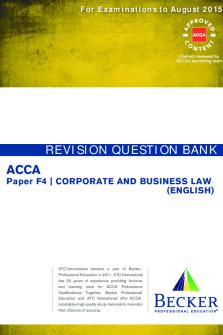
Revision Question Bank 60
- 154 Pages

REVISION QUESTION BANK
- 134 Pages

Revision Question BANK
- 77 Pages
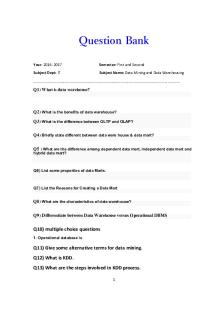
Dmdw-question bank - question bank
- 17 Pages

Ch 60 - Test bank
- 18 Pages

Revision Question N ANS
- 14 Pages

Question bank
- 8 Pages

F9FM Revision Question Practice
- 42 Pages
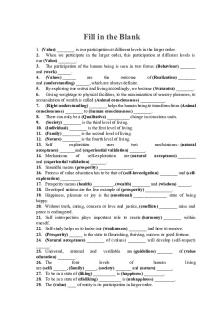
Question Bank 3question bank
- 6 Pages

Question BANK
- 19 Pages
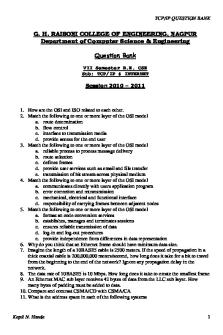
Tcp-ip-question-bank
- 25 Pages

Chapter 4 - Question Bank
- 28 Pages

DIP Question Bank Sheetal
- 14 Pages
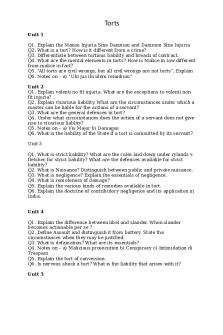
Torts Question Bank
- 2 Pages
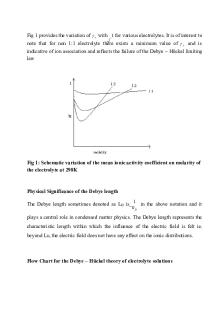
QB5 - Question Bank 5
- 104 Pages

Assessment Question Bank 1
- 22 Pages
Popular Institutions
- Tinajero National High School - Annex
- Politeknik Caltex Riau
- Yokohama City University
- SGT University
- University of Al-Qadisiyah
- Divine Word College of Vigan
- Techniek College Rotterdam
- Universidade de Santiago
- Universiti Teknologi MARA Cawangan Johor Kampus Pasir Gudang
- Poltekkes Kemenkes Yogyakarta
- Baguio City National High School
- Colegio san marcos
- preparatoria uno
- Centro de Bachillerato Tecnológico Industrial y de Servicios No. 107
- Dalian Maritime University
- Quang Trung Secondary School
- Colegio Tecnológico en Informática
- Corporación Regional de Educación Superior
- Grupo CEDVA
- Dar Al Uloom University
- Centro de Estudios Preuniversitarios de la Universidad Nacional de Ingeniería
- 上智大学
- Aakash International School, Nuna Majara
- San Felipe Neri Catholic School
- Kang Chiao International School - New Taipei City
- Misamis Occidental National High School
- Institución Educativa Escuela Normal Juan Ladrilleros
- Kolehiyo ng Pantukan
- Batanes State College
- Instituto Continental
- Sekolah Menengah Kejuruan Kesehatan Kaltara (Tarakan)
- Colegio de La Inmaculada Concepcion - Cebu